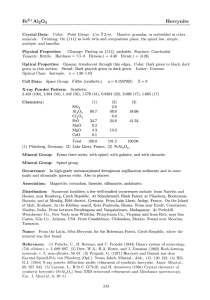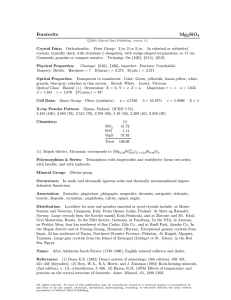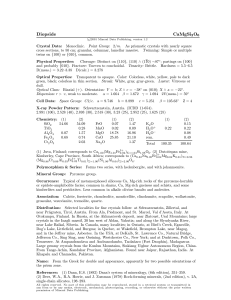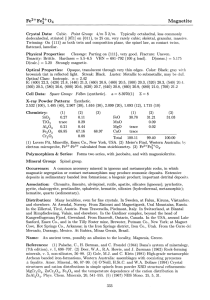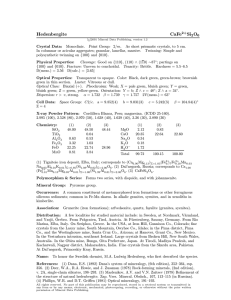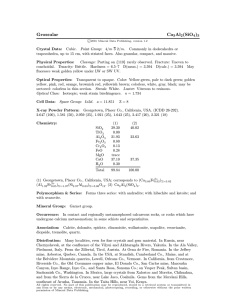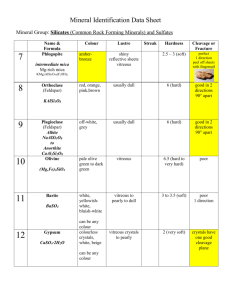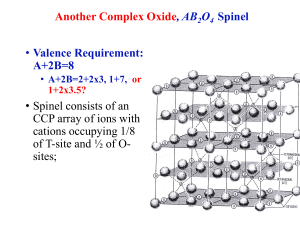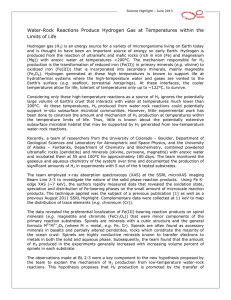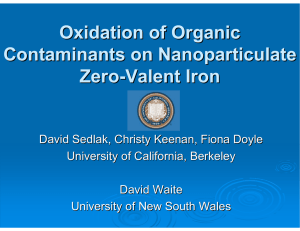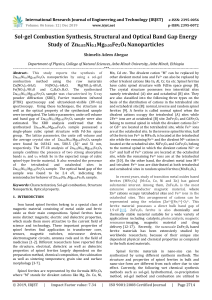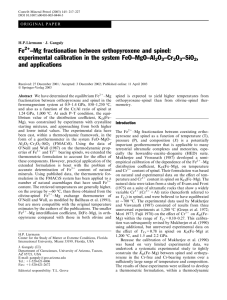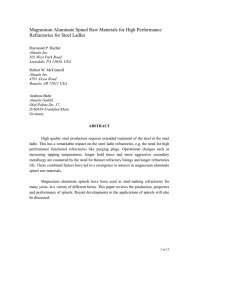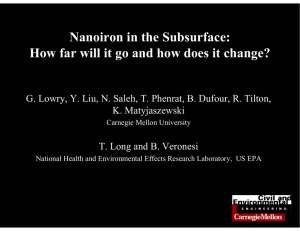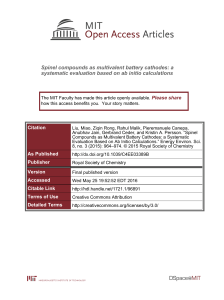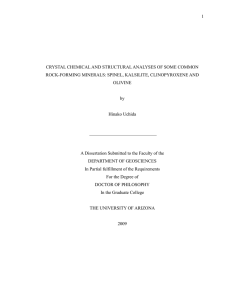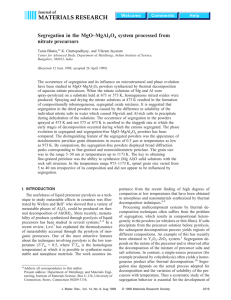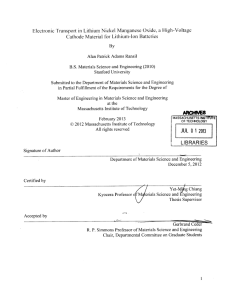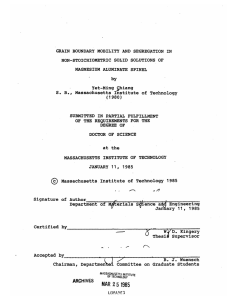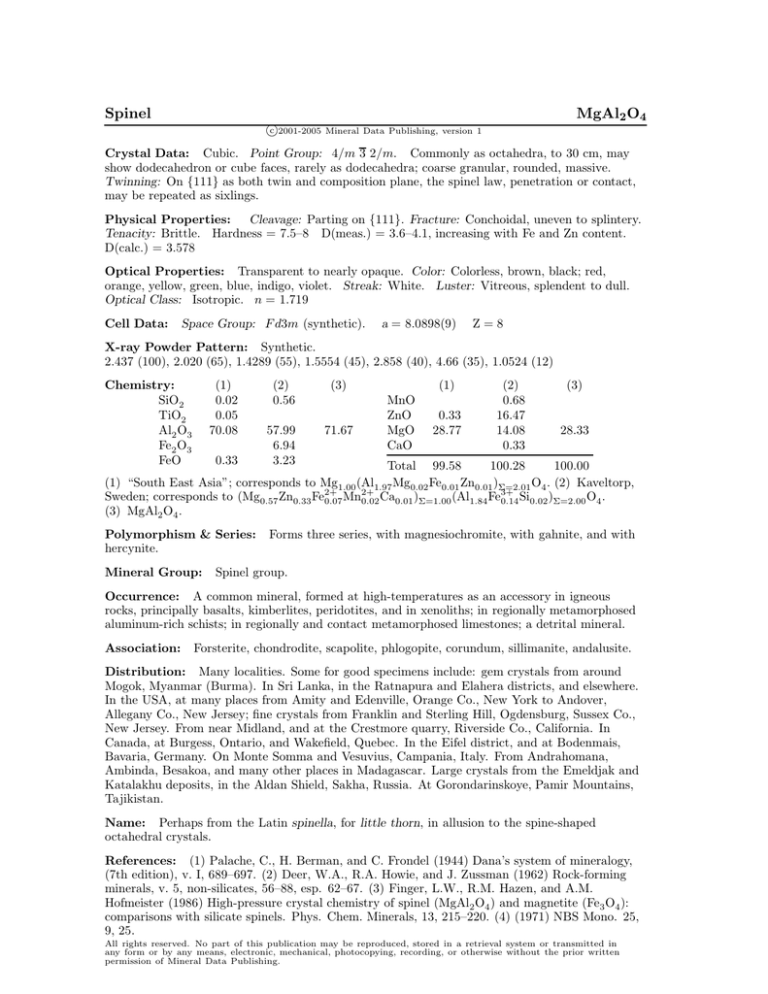
Spinel
MgAl2 O4
c 2001-2005
Mineral Data Publishing, version 1
Crystal Data: Cubic. Point Group: 4/m 3 2/m. Commonly as octahedra, to 30 cm, may
show dodecahedron or cube faces, rarely as dodecahedra; coarse granular, rounded, massive.
Twinning: On {111} as both twin and composition plane, the spinel law, penetration or contact,
may be repeated as sixlings.
Physical Properties: Cleavage: Parting on {111}. Fracture: Conchoidal, uneven to splintery.
Tenacity: Brittle. Hardness = 7.5–8 D(meas.) = 3.6–4.1, increasing with Fe and Zn content.
D(calc.) = 3.578
Optical Properties: Transparent to nearly opaque. Color: Colorless, brown, black; red,
orange, yellow, green, blue, indigo, violet. Streak: White. Luster: Vitreous, splendent to dull.
Optical Class: Isotropic. n = 1.719
Cell Data:
Space Group: F d3m (synthetic).
a = 8.0898(9)
Z=8
X-ray Powder Pattern: Synthetic.
2.437 (100), 2.020 (65), 1.4289 (55), 1.5554 (45), 2.858 (40), 4.66 (35), 1.0524 (12)
Chemistry:
SiO2
TiO2
Al2 O3
Fe2 O3
FeO
(1)
0.02
0.05
70.08
0.33
(2)
0.56
(3)
57.99
6.94
3.23
71.67
(1)
MnO
ZnO
MgO
CaO
0.33
28.77
(2)
0.68
16.47
14.08
0.33
(3)
28.33
Total 99.58
100.28
100.00
(1) “South East Asia”; corresponds to Mg1.00 (Al1.97 Mg0.02 Fe0.01 Zn0.01 )Σ=2.01 O4 . (2) Kaveltorp,
2+
3+
Sweden; corresponds to (Mg0.57 Zn0.33 Fe2+
0.07 Mn0.02 Ca0.01 )Σ=1.00 (Al1.84 Fe0.14 Si0.02 )Σ=2.00 O4 .
(3) MgAl2 O4 .
Polymorphism & Series:
hercynite.
Mineral Group:
Forms three series, with magnesiochromite, with gahnite, and with
Spinel group.
Occurrence: A common mineral, formed at high-temperatures as an accessory in igneous
rocks, principally basalts, kimberlites, peridotites, and in xenoliths; in regionally metamorphosed
aluminum-rich schists; in regionally and contact metamorphosed limestones; a detrital mineral.
Association:
Forsterite, chondrodite, scapolite, phlogopite, corundum, sillimanite, andalusite.
Distribution: Many localities. Some for good specimens include: gem crystals from around
Mogok, Myanmar (Burma). In Sri Lanka, in the Ratnapura and Elahera districts, and elsewhere.
In the USA, at many places from Amity and Edenville, Orange Co., New York to Andover,
Allegany Co., New Jersey; fine crystals from Franklin and Sterling Hill, Ogdensburg, Sussex Co.,
New Jersey. From near Midland, and at the Crestmore quarry, Riverside Co., California. In
Canada, at Burgess, Ontario, and Wakefield, Quebec. In the Eifel district, and at Bodenmais,
Bavaria, Germany. On Monte Somma and Vesuvius, Campania, Italy. From Andrahomana,
Ambinda, Besakoa, and many other places in Madagascar. Large crystals from the Emeldjak and
Katalakhu deposits, in the Aldan Shield, Sakha, Russia. At Gorondarinskoye, Pamir Mountains,
Tajikistan.
Name: Perhaps from the Latin spinella, for little thorn, in allusion to the spine-shaped
octahedral crystals.
References: (1) Palache, C., H. Berman, and C. Frondel (1944) Dana’s system of mineralogy,
(7th edition), v. I, 689–697. (2) Deer, W.A., R.A. Howie, and J. Zussman (1962) Rock-forming
minerals, v. 5, non-silicates, 56–88, esp. 62–67. (3) Finger, L.W., R.M. Hazen, and A.M.
Hofmeister (1986) High-pressure crystal chemistry of spinel (MgAl2 O4 ) and magnetite (Fe3 O4 ):
comparisons with silicate spinels. Phys. Chem. Minerals, 13, 215–220. (4) (1971) NBS Mono. 25,
9, 25.
All rights reserved. No part of this publication may be reproduced, stored in a retrieval system or transmitted in
any form or by any means, electronic, mechanical, photocopying, recording, or otherwise without the prior written
permission of Mineral Data Publishing.

